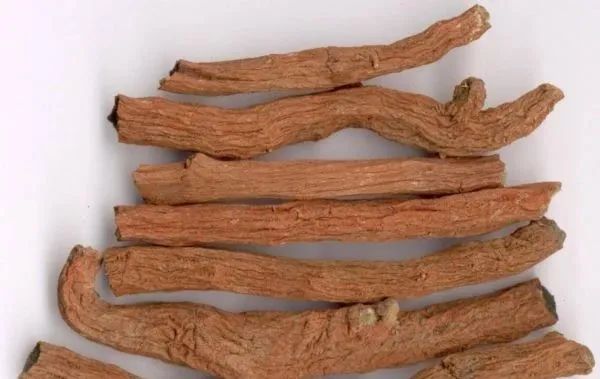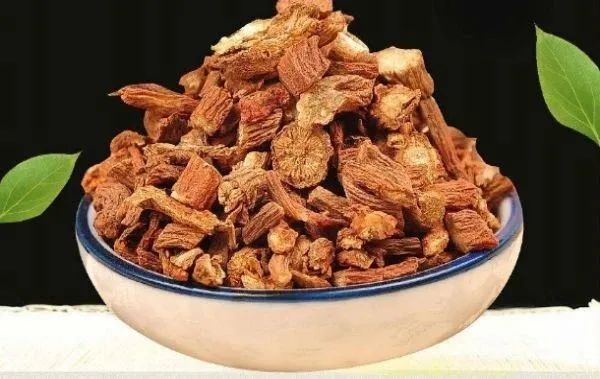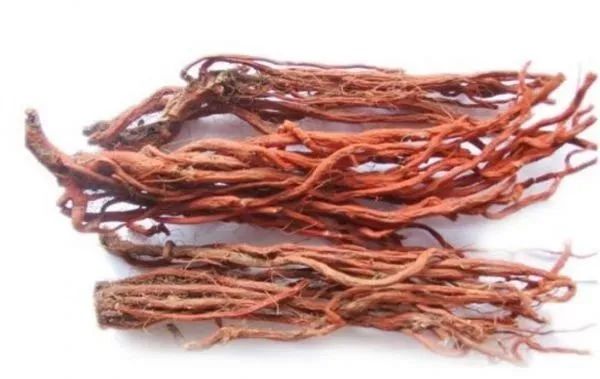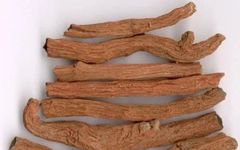In our daily lives, we often see people selling Salvia Miltiorrhiza (Dan Shen), a highly favored traditional Chinese medicine (TCM) herb known for its nutritional value. Some people enjoy brewing Salvia Miltiorrhiza in water, making it both nutritious and delicious.
Benefits of Drinking Salvia Miltiorrhiza Tea
1. Regulating Menstruation and Alleviating Pain: Salvia Miltiorrhiza has the effect of promoting blood circulation and removing blood stasis. In TCM, conditions such as dysmenorrhea, amenorrhea, and irregular menstruation are attributed to blood stasis. Therefore, for women experiencing these symptoms, drinking Salvia Miltiorrhiza tea can provide some relief.
2. Promoting Blood Circulation: Pharmacological studies show that the component tanshinone in Salvia Miltiorrhiza enhances myocardial contractility and dilates coronary blood vessels, thereby improving microcirculation and preventing cardiovascular and cerebrovascular diseases.
3. Liver Protection: Experimental studies indicate that Salvia Miltiorrhiza promotes liver regeneration, possibly by improving local blood circulation in the liver, thus enhancing the factors involved in liver regeneration. Therefore, it plays a role in the repair of liver damage.
4. Anti-tumor Effects: Pharmacological experiments have shown that Salvia Miltiorrhiza exhibits some inhibitory effects on cancer cell activity, although its specific anti-tumor mechanisms remain unclear.

Effects and Functions of Salvia Miltiorrhiza
1. Promoting Blood Circulation and Removing Blood Stasis
Salvia Miltiorrhiza has a strong effect on promoting blood circulation and removing blood stasis, improving blood flow, promoting tissue repair, and accelerating fracture healing.
2. Lowering Blood Lipids
Salvia Miltiorrhiza can lower blood lipids and inhibit atherosclerosis.
3. Liver Protection
Salvia Miltiorrhiza protects liver cells from damage and promotes liver cell regeneration, exhibiting anti-fibrotic effects.
4. Cardiovascular Effects
Salvia Miltiorrhiza effectively dilates coronary arteries, increases myocardial blood flow, dilates peripheral blood vessels, increases blood flow, reduces cerebral blood flow, inhibits coagulation, promotes fibrinolysis, inhibits platelet aggregation, and prevents thrombosis.
5. Antibacterial Effects
Salvia Miltiorrhiza exhibits antibacterial activity against both sensitive and resistant strains of Staphylococcus aureus.
6. Anti-tumor Effects
Salvia Miltiorrhiza has inhibitory effects on the central nervous system and exhibits anti-tumor properties.
7. Delaying Aging
Salvia Miltiorrhiza contains vitamin E, which inhibits monoamine oxidase, a substance associated with aging, thereby achieving anti-aging effects.
8. Prevention and Treatment of Diabetes
The compound Salvia Miltiorrhiza drop pills show significant efficacy in treating cardiovascular diseases such as diabetes, hyperlipidemia, atherosclerotic plaques, and senile hypertension.
Main Effects and Functions
1. Cardiovascular System Effects
1.1 Strengthening the Heart: Enhances myocardial contractility and improves heart function without increasing myocardial oxygen consumption.
1.2 Vascular Effects: Dilates coronary arteries, increases myocardial blood flow; dilates peripheral blood vessels, increases blood flow; reduces cerebral blood flow.
1.3 Anti-thrombus Formation: Increases fibrinolytic activity; prolongs bleeding and coagulation time; inhibits platelet aggregation (increases cAMP levels in platelets, inhibiting TXA2 synthesis); improves blood rheological properties (reduces blood viscosity, shortens erythrocyte sedimentation time).
1.4 Improves Microcirculation.
2. Promoting Tissue Repair and Regeneration
2.1 Promotes tissue repair and regeneration: Salvia Miltiorrhiza preparations accelerate the clearance of necrotic myocardium; fibroblast differentiation and collagen fiber formation are more pronounced; granulation tissue formation is relatively mature. Local congestion is alleviated, blood circulation improves, and healing time is shortened.
2.2 Inhibits Excessive Proliferation: Inhibits excessive proliferation of fibroblasts.
3. Liver Protection: Improves liver microcirculation.
4. Antibacterial: Salvia Miltiorrhiza preparations contain cryptotanshinone and dihydrotanshinone, which inhibit Staphylococcus, Escherichia coli, and Proteus in vitro.
Dietary Effects of Salvia Miltiorrhiza
Salvia Miltiorrhiza has a bitter and slightly pungent taste, with a slightly cold nature; it affects the heart, spleen, liver, and kidney blood. It has the effects of promoting blood circulation and removing blood stasis, nourishing blood and calming the mind, cooling blood and reducing swelling; it is indicated for blood stasis-related pain in the head, chest, flank, and abdomen, masses, irregular menstruation, dysmenorrhea, postpartum abdominal pain due to stasis, joint pain, trauma, warm disease with irritability, blood deficiency with palpitations, and carbuncles and swellings.

Applications of Salvia Miltiorrhiza
Used for chest and rib pain, rheumatic pain, masses, carbuncles and swellings, trauma pain, irregular menstruation, dysmenorrhea, and postpartum pain due to stasis. It is effective in treating chest and rib pain, masses, as well as irregular menstruation and dysmenorrhea, often used in combination with Chuanxiong (Ligusticum chuanxiong). In treating chest and abdominal pain related to qi stagnation and blood stasis, it is often combined with Amomum (Sha Ren) and Sandalo (Tan Xiang).

Three Important Precautions for Salvia Miltiorrhiza
1. Drug Contraindications: According to TCM contraindications, “various ginsengs and spicy peonies oppose Rhubarb“; Salvia Miltiorrhiza and Rhubarb should not be used together. Additionally, Salvia Miltiorrhiza should not be used with aspirin, vitamin K, and other medications to avoid bleeding symptoms.
2. Population Contraindications: Salvia Miltiorrhiza has a blood-promoting effect and should be avoided by pregnant women and individuals with bleeding tendencies. Furthermore, those with allergic constitutions should use Salvia Miltiorrhiza with caution.
3. Food Contraindications: Salvia Miltiorrhiza should not be consumed with foods rich in iron, calcium, and magnesium, as the effective tanshinone in Salvia Miltiorrhiza may react with these elements, reducing its efficacy. Foods rich in iron and calcium include animal liver, black fungus, milk, and soybeans.

